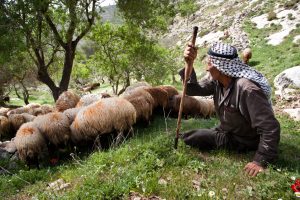Danny Stone, Springville, IA
Warm-up Questions
Our “Pandemic Year” has forced us to adapt to new challenges and change our ways. What adaptations and changes will you keep? What will you prune?
More Than Just Surviving
Imagine being born into a pandemic and having the same pestilence return when you are 18, 28, 39, 42, and 44. These outbreaks are particularly. nasty and can easily kill 1 out of 5 in a community. As you would expect, each episode comes with quarantines and restrictions. Markets, gatherings, restaurants and theaters are closed for extended periods. Sound familiar? How would you react if you were a locally famous, London playwright forced into isolation? Would you sulk? Or would you write Macbeth, Antony and Cleopatra, The Winter’s Tale and The Tempest? William Shakespeare’s career and life were marked by six eruptions of the bubonic plague. He survived, adapted, and incorporated battling the disease into his plays.
“A plague on both your houses.” – Romeo and Juliet: Act 3, Scene 1, Line 1594
“Thou art a boil” – King Lear: Act 2, Scene 4, Line 219
Maybe a new Shakespeare is right now writing a brilliant tragedy. Some of us have made incredible leaps as we cope with Covid 19. Some of us face daily struggles, loneliness, isolation, and financial ruin. 567,000 of our neighbors have lost their lives. A very unscientific Facebook poll asked 1300 Americans to answer, “How has the pandemic changed your life, and will you make any of these changes permanent?”
Matt – Georgia
Matt moved from a community in Michigan that refused to mask or social distance. “So we left. In the beginning it was socially distant RV trips to other parts of the country to see natural splendor. In the end it was full-on relocation to a place with a better climate (weather) and a better climate (diverse and progressive).”
Kellie – Iowa and Germany
“I learned a lot about myself. I’ve explored new interests and had some time to explore who I am outside of “teacher.” My husband and I also grew closer as we had to get more creative with our conversations since we spent every day at home with each other. It also helped, I suppose, that we moved across the world with just each other for company. I have learned how selfish many Americans are, and I hope that some of these practices (like wearing a mask when you are sick) become the norm. I also hope that this slower pace of life becomes the norm. We as a society are so over scheduled, and I think it’s been nice to have a chance to stop and just be.”
Jenna – Texas
“The pandemic gave me time to *be* and heal and slow down, which I appreciate immensely. It also severely slowed/cut my business, which was rough. But, I qualify & am working through a PPP loan application. I will carry a few changes into post-pandemic life. Prioritizing some time to myself and remembering that I can get by on less than I think I can. And focusing more on recording and not just live performances in the next few years.”
Paula – Iowa
“This past year gave me great pause. It made me look at facets of life through different lenses- everything from family, work, faith, community, society, etc. The good, the bad and the ugly became really transparent. I found myself very disappointed in others’ behaviors and at the same time I gained a true appreciation for the kindness of neighbors. Things that I will carry forward… remote connection through zoom, intentional calls and convos with family/friends. Ordering online groceries. Support small local businesses more intentionally. Focus on living in the moment. Not take the basics for granted.”
Heather – Texas
“I think it definitely showed me how important slowing down is and I want to make that as permanent as possible.”
Mike – California
“I’m in my late 50s. I lost 2 sources of employment and stayed home most of the time. I have a lot to own up to. No human should waste time the way I did. I watched way too much news, as I felt like a sentry at the gates of sanity & integrity. Anxiety! I got really good at internet card games rather than reading or learning a new hobby. I also found out how few of my friends couldn’t be bothered to call me and talk (I initiated almost all my phone conversations). It was a horribly unproductive period, but hopefully my awareness is now raised. When 2/3 of your life is behind you, there’s no time to waste. I feel like I just wasted a precious year.”
Discussion Questions
- Shakespeare wrote masterpieces and Mike from California felt he wasted a year. Where did you fall on this continuum? Did you get stuff done or did you stagnate?
- Imagine that a friend did a “Rip Van Winkle” and slept through 2020/2021? What would you say to catch them up on the year?
- How has your congregation changed? Will it ever go back to “normal?”
Fifth Sunday of Easter
(Text links are to Oremus Bible Browser. Oremus Bible Browser is not affiliated with or supported by the Evangelical Lutheran Church in America. You can find the calendar of readings for Year B at Lectionary Readings.)
For lectionary humor and insight, check the weekly comic Agnus Day.
Gospel Reflection
Hooray for spring and new life. Yes, it is time to roll in the grass and celebrate! The poet, E.E. Cummings called spring “mud-luscious” and “puddle-wonderful.” Soak it all up and take a deep breath. Let’s get outside and enjoy the gifts of the season. Watch the clouds. Jump in a puddle! Prepare the world for her fertile days. We all need a break and a glorious spring to wash off the dust of this past year.
Central to this passage from John is the word “abide.” It is translated from the Greek word “meno” meaning, “to survive or live.” Simply put, Jesus calls us to live in him. Living in Jesus changes our perspective of the world. Instead of living in a moment, we live in Christ and he lives in us. It is like living in an eternal spring, lovingly held in the gardener’s hands. In return, God asks us to bear fruit and share the Good News. Your fruits may be your service to others, the music you create, the plays you write or the love you share.
Discussion Questions
- How do you live in Jesus? Do you feel you are part of the vine?
- Branches “thrown into the fire” has always troubled scholars. What do you think happens to the branches that wither and are burned?
Activity Suggestions
- Have your group research community gardens that need volunteers. Set a time to volunteer!
- Assist with grounds maintenance at your congregation or visit members who need assistance with their yards.
- Plant seedlings for fruits, flowers, or vegetables. Start your own Youth Ministry garden in a window box, planter, bucket, flower bed, or garden plot.
Closing Prayer
Dear Blessed Creator! Thank you for the miracles of spring and the promise of life in you. Help us to be fruitful disciples of your love. May we live in the warmth of sun in your eternal garden. You are the vine, and we are the branches! Amen.





